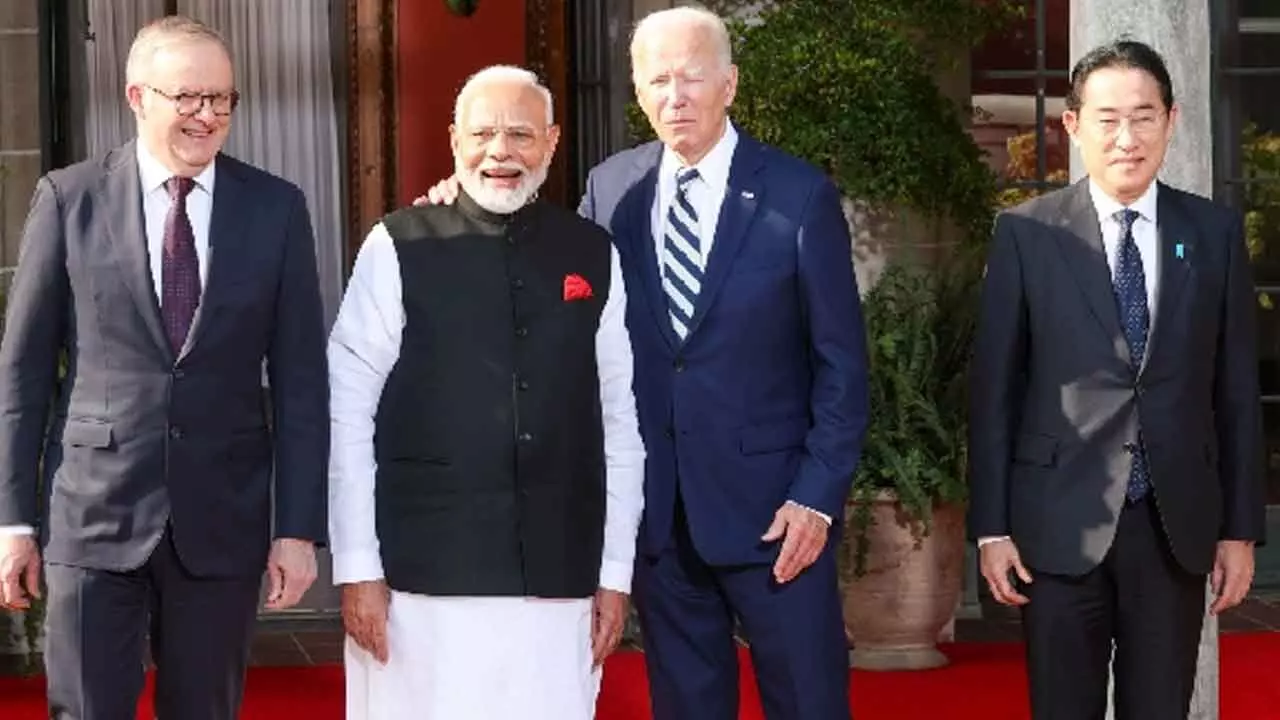Quad’s Subtle Yet Strong Message To China

Even as the members of the Quad, or the Quadrilateral Security Dialogue, have decided on forging closer ties among themselves, US President Biden inadvertently let the cat out of the bag that China is indeed the main concern. All other issues paled before it.
PM Narendra Modi, US President Joe Biden, Australian PM Anthony Albanese and Japanese PM Fumio Kishida just met at the Quad Leaders’ summit at Wilmington in Delaware state in the US to open their hearts on issues specific to Asia Pacific region and other global issues such as wars being waged by Ukraine and Israel. If at all the summit achieved anything, it is their greater resolve to come closer and strengthen the bonds. “A free, open, inclusive and prosperous Indo-Pacific is our shared priority and shared commitment,” they affirmed, while also exploring initiatives in areas such as health, security, critical and emerging technologies, climate change and capacity building.
All being democracies, where rule of law reigns, they are now more strategically aligned than ever before to counter any threat to international rules-based order. The summit decided on extending new maritime technologies to their regional partners in the Indo-Pacific region. For the first time, a convergence among coast guards will be forged to improve interoperability and advance maritime safety. The four leaders strongly committed to “maintenance of peace, safety, security and stability in the maritime domain, underpin the sustainable development, and prosperity of the Indo-Pacific. We emphasize the importance of adherence to international law, particularly as reflected in the United Nations Convention on the Law of the Sea (UNCLOS)… We are seriously concerned about the situation in the East and South China Seas.”
It is in a way strong yet subtle message to China over its growing aggressive behaviour in both China Seas. China claims sovereignty over the areas covered by its nine-dash line, a set of line segments on maps, in the South China Sea, such as Pratas Islands, Paracel Islands, Macclesfield Bank, Scarborough Shoal, and the Spratlys Islands. Its claims overlap with those of Brunei, Indonesia, Malaysia, the Philippines, Taiwan, and Vietnam. It even defies an order in 2016 by the Permanent Court of Arbitration at Hague against its territorial claims.
More than one-fifth of global trade, estimated at about $3.4 trillion in 2016, passes through the South China Sea. Its Strait of Malacca is a key crossroads between the Pacific and the Indian Oceans. It is also rich in oil, natural gas, and fish. If China has its way, it can use Taiwan Strait, East China Sea and South China Sea to stall cargo traffic to Korean Peninsula and Japanese Archipelago, and hence the involvement of Japan in the Quad.
In East China Sea (ECS), China has high tensions with Japan and South Korea over its claims on exclusive economic zones. Connected to the SCS, the Yellow Sea, the Sea of Japan and the Pacific Ocean, the ECS is at the crossroads of global commerce.
Amidst these developments, Australia which quit the Quad in 2008, a year after its inception, over fears of hurting its interests with China later rejoined it, realising the dragon’s threat to regional peace and global commerce. India’s stand at the Quad is a balanced one. In a clear signal to China, PM Modi said that they “are not against anyone”, but are together only to support a rules-based international order, respect for sovereignty and territorial integrity, and peaceful resolution of all issues. China is given a subtle, yet strong, warning not to attempt to unilaterally change the status quo in maritime disputes by force or coercion.











